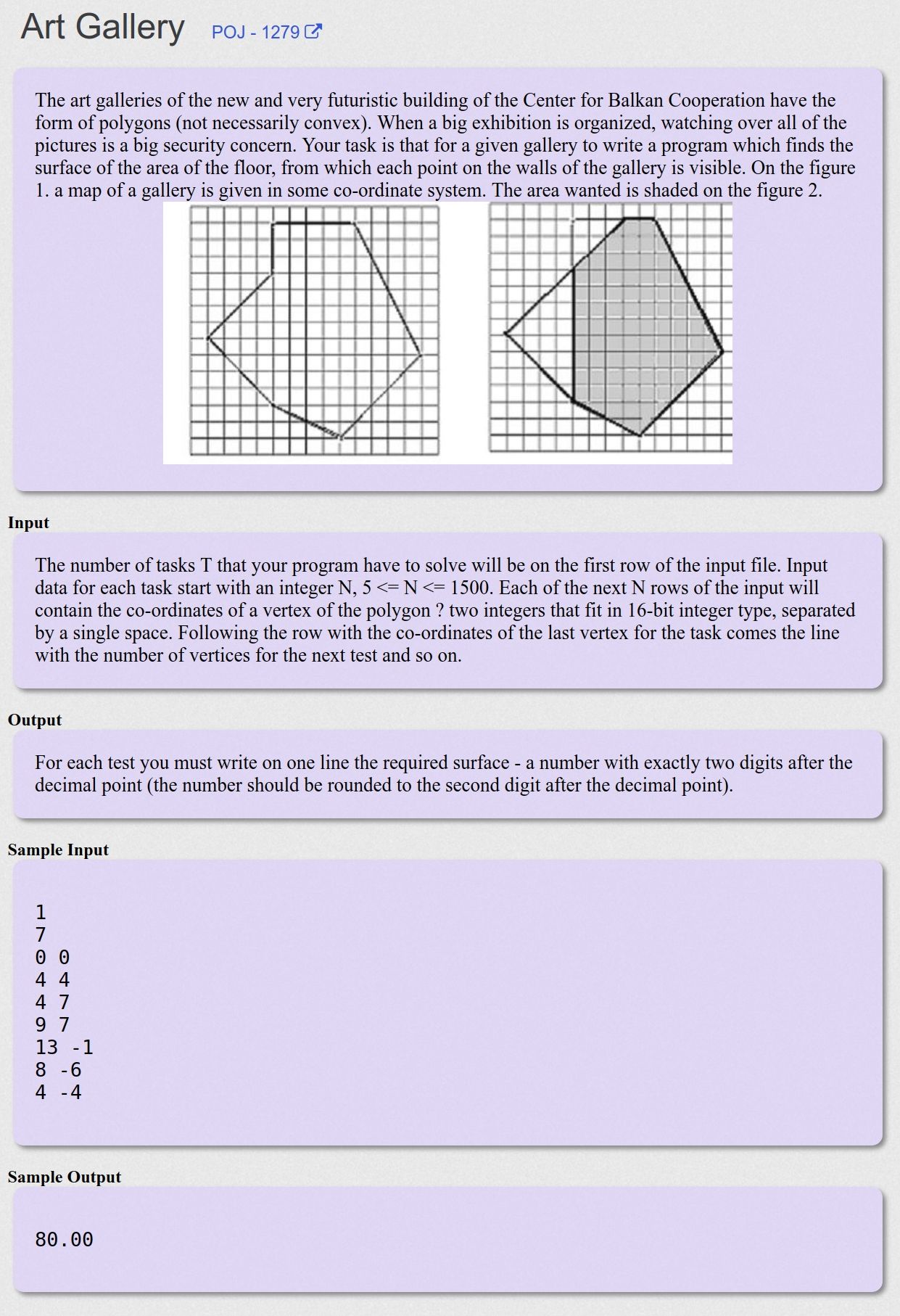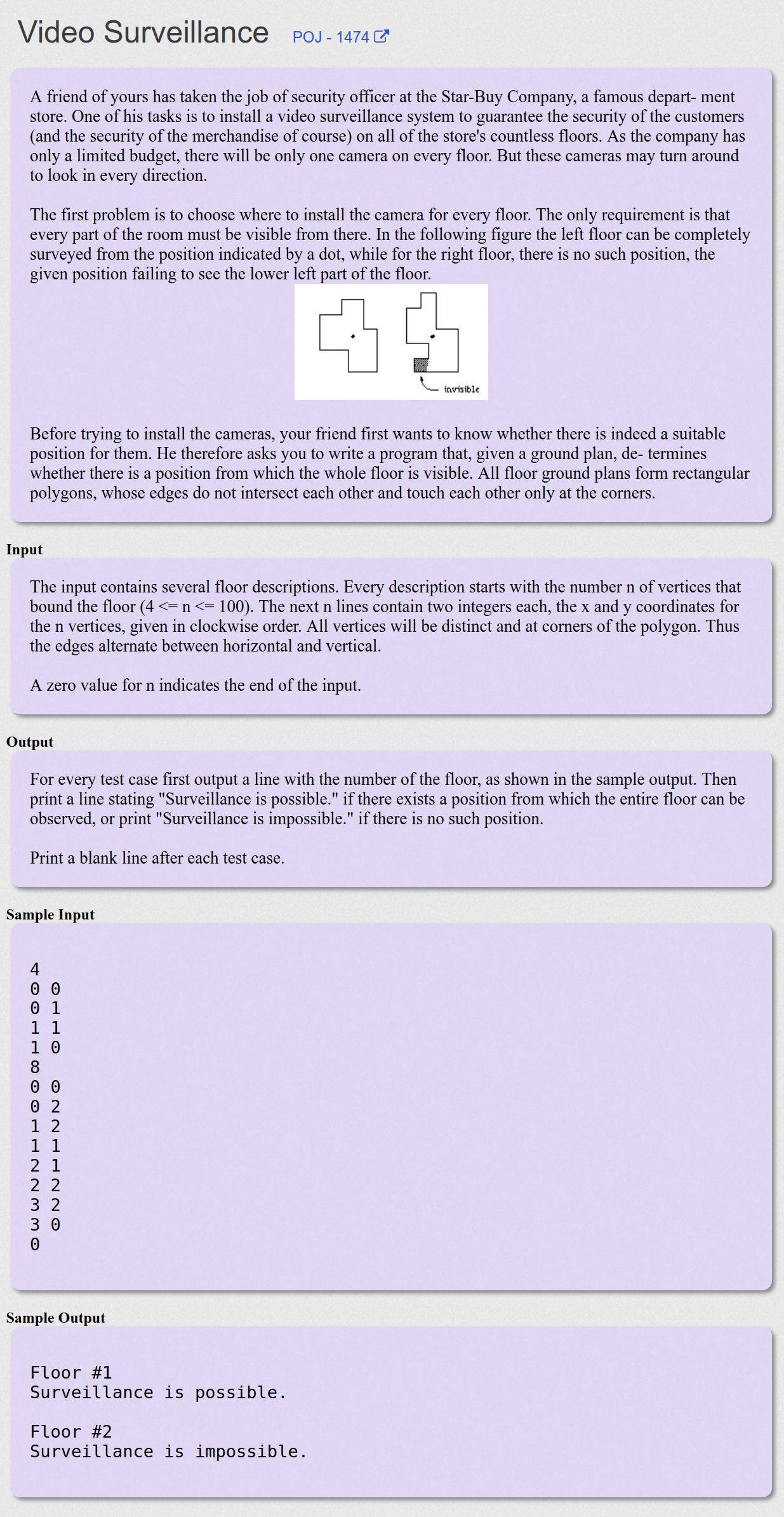半平面交(zzy的nlogn增量法)
前言
在ACM知识体系中个人最不喜计算几何,于是体验了一把什么叫做基础计算几何全不会然后直接上半平面交的酸爽 T^T
只要模板题,拓展部分当然是遇到题目再提_(:з」∠)_ (我不会说其实是为了补南京网赛题才来学半平面交的)
Art Gallery - POJ - 1279

链接
https://cn.vjudge.net/problem/POJ-1279
题意
求多边形核的面积
思路
半平面交模板题,使用的是zzy大神的增量法
#include <cstdio>
#include <cstring>
#include <vector>
#include <deque>
#include <cmath>
#include <algorithm>
using namespace std;
const int N = 1500 + 15;
const double eps = 1e-8;
struct Point{
double x, y;
Point() {}
Point(double x, double y): x(x), y(y) {}
Point operator - (const Point& b) {
return Point(x - b.x, y - b.y);
}
};
typedef Point Vector;
struct Line{
Point a, b;
double angle;
void getAngle() {angle = atan2(b.y - a.y, b.x - a.x);}
Line(){}
Line(Point a, Vector b): a(a), b(b) {}
};
vector<Line> hp;
vector<Point> pt;
vector<Point> ans;
Line que[N];
int dcmp(double x) {
return x < -eps ? -1 : x > eps;
}
double cross(Vector a, Vector b){
return a.x * b.y - a.y * b.x;
}
double area(Point a, Point b, Point c) {
return cross(b - a, c - a);
}
// 点是否在线的右边(不含在线上的情况)
bool isOnLineRight(Line u, Point v){
return dcmp(cross(u.b - u.a, v - u.a)) < 0;
}
// 按极角顺时针排序
bool cmp(Line u, Line v) {
int d = dcmp(u.angle - v.angle);
if(d) return d > 0;
return dcmp(cross(u.b - u.a, v.b - u.a)) < 0;
}
Point getLineIntersection(Line u, Line v){
Point ret = u.a;
double t = ((u.a.x-v.a.x) * (v.a.y-v.b.y)
-(u.a.y-v.a.y) * (v.a.x-v.b.x))
/ ((u.a.x-u.b.x) * (v.a.y-v.b.y)
-(u.a.y-u.b.y) * (v.a.x-v.b.x));
ret.x += (u.b.x-u.a.x) * t, ret.y += (u.b.y-u.a.y) * t;
return ret;
}
// 判断l2,l3的交点时候在l1的右边
bool judge(Line l1, Line l2, Line l3) {
Point p = getLineIntersection(l2, l3);
return isOnLineRight(l1, p);
}
void hpi(){//half-plane intersection
ans.clear();
sort(hp.begin(), hp.end(), cmp);
int m = 0;
// 平行的取第一个,与排序函数的写法有关,反正是取最左边的(严格的说,应该是向量的左边)
for(int i = 0; i < hp.size(); i++){
if(i && dcmp(hp[i].angle - hp[m - 1].angle) == 0) continue;
hp[m++] = hp[i];
}
hp.erase(hp.begin() + m, hp.end());
que[1] = hp[0], que[2] = hp[1];
int head = 1, tail = 2;
for(int i = 2; i < hp.size(); i++){
while(head < tail && judge(hp[i], que[tail - 1], que[tail])) tail--;
while(head < tail && judge(hp[i], que[head + 1], que[head])) head++;
que[++tail] = hp[i];
}
while(head < tail && judge(que[head], que[tail - 1], que[tail])) tail--;
while(head < tail && judge(que[tail], que[head + 1], que[head])) head++;
if(tail <= head + 1){ //若半平面交退化为点或线
return;
}
// 为了方便记录,直接把最后一条线放到最前面,避免最后还要保存头尾两条线的交点
que[head - 1] = que[tail];
for(int i = head; i <= tail; i++){
ans.push_back(getLineIntersection(que[i], que[i - 1]));
}
}
int main(){
int t;
scanf("%d", &t);
while(t--){
hp.clear();
pt.clear();
int n;
scanf("%d", &n);
for(int i = 0; i < n; i++){
double x, y;
scanf("%lf%lf", &x, &y);
pt.push_back(Point(x, y));
if(i){
hp.push_back(Line(pt[i], pt[i - 1]));
hp[hp.size() - 1].getAngle();
}
}
hp.push_back(Line(pt[0], pt[n - 1]));
hp[hp.size() - 1].getAngle();
hpi();
double res = 0;
for(int i = 2; i < ans.size(); i++){
res += area(ans[0], ans[i - 1], ans[i]);
}
printf("%.2f\n", fabs(res / 2) + eps);
}
return 0;
}
Video Surveillance - POJ 1474

链接
https://cn.vjudge.net/problem/POJ-1474
题意
判定多边形是否有核
思路
还是模板题,但是需要注意不是面积为0就无核,因为求出来的核可能是线或者点,面积也为0,因此应该判定最后队列中线的数量,若3条及以上则是有核的
同时注意isOnLineRight函数中不能判定在点在线上为true
#include <cstdio>
#include <cstring>
#include <vector>
#include <deque>
#include <cmath>
#include <algorithm>
using namespace std;
const int N = 1500 + 15;
const double eps = 1e-8;
struct Point{
double x, y;
Point() {}
Point(double x, double y): x(x), y(y) {}
Point operator - (const Point& b) {
return Point(x - b.x, y - b.y);
}
};
typedef Point Vector;
struct Line{
Point a, b;
double angle;
void getAngle() {angle = atan2(b.y - a.y, b.x - a.x);}
Line(){}
Line(Point a, Vector b): a(a), b(b) {}
};
vector<Line> hp;
vector<Point> pt;
Line que[N];
int dcmp(double x) {
return x < -eps ? -1 : x > eps;
}
double cross(Vector a, Vector b){
return a.x * b.y - a.y * b.x;
}
double area(Point a, Point b, Point c) {
return cross(b - a, c - a);
}
bool isOnLineRight(Line u, Point v){
return dcmp(cross(u.b - u.a, v - u.a)) < 0;
}
bool cmp(Line u, Line v) {
int d = dcmp(u.angle - v.angle);
if(d) return d > 0;
return dcmp(cross(u.b - u.a, v.b - u.a)) < 0;
}
Point getLineIntersection(Line u, Line v){
Point ret = u.a;
double t = ((u.a.x-v.a.x) * (v.a.y-v.b.y)
-(u.a.y-v.a.y) * (v.a.x-v.b.x))
/ ((u.a.x-u.b.x) * (v.a.y-v.b.y)
-(u.a.y-u.b.y) * (v.a.x-v.b.x));
ret.x += (u.b.x-u.a.x) * t, ret.y += (u.b.y-u.a.y) * t;
return ret;
}
bool judge(Line l1, Line l2, Line l3) {
Point p = getLineIntersection(l2, l3);
return isOnLineRight(l1, p);
}
bool hpi(){
sort(hp.begin(), hp.end(), cmp);
int m = 0;
for(int i = 0; i < hp.size(); i++){
if(i && dcmp(hp[i].angle - hp[m - 1].angle) == 0) continue;
hp[m++] = hp[i];
}
hp.erase(hp.begin() + m, hp.end());
que[1] = hp[0], que[2] = hp[1];
int head = 1, tail = 2;
for(int i = 2; i < hp.size(); i++){
while(head < tail && judge(hp[i], que[tail - 1], que[tail])) tail--;
while(head < tail && judge(hp[i], que[head + 1], que[head])) head++;
que[++tail] = hp[i];
}
while(head < tail && judge(que[head], que[tail - 1], que[tail])) tail--;
while(head < tail && judge(que[tail], que[head + 1], que[head])) head++;
return tail - head >= 2;
}
int main(){
int n, csn = 1;
while(~scanf("%d", &n) && n){
hp.clear();
pt.clear();
for(int i = 0; i < n; i++){
double x, y;
scanf("%lf%lf", &x, &y);
pt.push_back(Point(x, y));
if(i){
hp.push_back(Line(pt[i], pt[i - 1]));
hp[hp.size() - 1].getAngle();
}
}
hp.push_back(Line(pt[0], pt[n - 1]));
hp[hp.size() - 1].getAngle();
printf("Floor #%d\n", csn++);
if(hpi()){
puts("Surveillance is possible.");
}else{
puts("Surveillance is impossible.");
}
puts("");
}
return 0;
}


